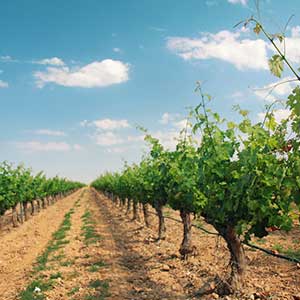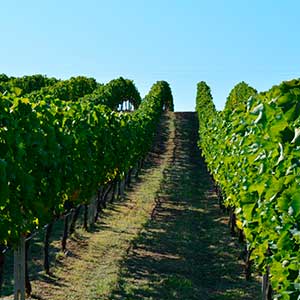Spain
Major Spanish wine regions include the Rioja and Ribera del Duero, which are known for their Tempranillo production. Spain is the second-largest producer of wine in the world.

Vegan Wines are made without animal-derived products. All ethical vegans try to exclude all forms of animal exploitation from their lifestyle even from the wine they drink. The vegan wines presented in this online shop are transparent. Winemakers either leave the particles to sink naturally to the bottom of the wine or use non-animal fining products when producing the wine.
Vegan Wines are made without animal-derived products. All ethical vegans try to exclude all forms of animal exploitation from their lifestyle even from the wine they drink. The vegan wines presented in this online shop are transparent. Winemakers either leave the particles to sink naturally to the bottom of the wine or use non-animal fining products when producing the wine.
Thankfully, there are several fining agents animal-friendly and they are used to make vegan wine. Carbon, silica gel, bentonite clay, kaolin clay, plant casein, limestone, and vegetable plaques are animal-friendly.

When it comes to wine, the term “natural” is gaining popularity, and for good reason. Natural wines offer a unique and delightful drinking experience that

Some people claim that matching wine and chocolate is impossible, but it is possible if you pick the appropriate wine to go with the correct

For us, this has always been a crucial subject. Is there sugar in your wine? is one of our earlier blog pieces where you may

Major Spanish wine regions include the Rioja and Ribera del Duero, which are known for their Tempranillo production. Spain is the second-largest producer of wine in the world.

Vegan wine has been grown and produced in South Africa for thousands of years, with major vineyard and production centres at Constantia, Paarl, Stellenbosch and Worcester.

German wine is known for its aromatic white wines. German vegan wines are exported primarily to US and UK. Germany as the eighth-largest wine-producing country in the world.

The Australian wine industry is one of the world’s largest exporters of wine, with approximately 800 million out of the 1.2 to 1.3 billion litres produced annually exported to overseas markets

Argentina continues to grow their wine production year after year resulting in the highest growth rate (8%) of the top 5 wine producers in the world. Argentina relies on wine exports.

Wine has been produced in the United States since the 1500s, with the first widespread production beginning in New Mexico in 1628. In the USA, certified organic wine is wine made with organically grown grapes

Italian production of wine extends from the Alps to the southern regions. Home to some of the oldest wine-producing regions in the world. Italy is the world’s largest producer of wine.

France is one of the largest wine producers in the world, Producing top vegan wine fully certified! French wine traces its history to the 6th century BC, with many of France’s regions dating their wine-making history to Roman times.
Vegan, Vegan-friendly, and Vegetarian Wines are becoming more popular. Vegan wines are those that do not include any animal ingredients or byproducts.
When seeking for vegan wines, vegetarians and vegans are frequently surprised to hear that ingredients such as egg whites, milk, fish bladders, and even dried blood have occasionally been used in the wine production process. This is used to clarify or colour the wine. For Bordeaux wines, for example, the addition of egg whites are used to push sediment to settle to the bottom of the wine barrel (the egg white sinks and takes the sediment with it). Therefore, buying vegan wines may be difficult, and only websites that specialise in vegan wines deserve careful consideration. Only wineries with a real dedication to vegetarian, vegan, and vegan-friendly wines would create vegan wines. They tend to be the brands available exclusively in specialised wine merchants.
It is a source of frustration for vegans and vegetarians looking to purchase vegan wines. Unlike almost all other products, wineries are not required to list ‘additives’ or products, particularly non-vegan friendly products used in the winemaking process. However, some, such as bull’s blood, are now illegal. Lucky alternative techniques for producing vegan wines are being adopted. Bottling is one example of utilising mineral-based treatments to ‘fine’ or clarify a wine for the vegan and vegetarian markets.
Fortunately for vegans and vegetarians, an increasing number of wineries are shifting to natural winemaking procedures, with several wines even winning international wine prizes in competition with their non-vegan friendly competitors.